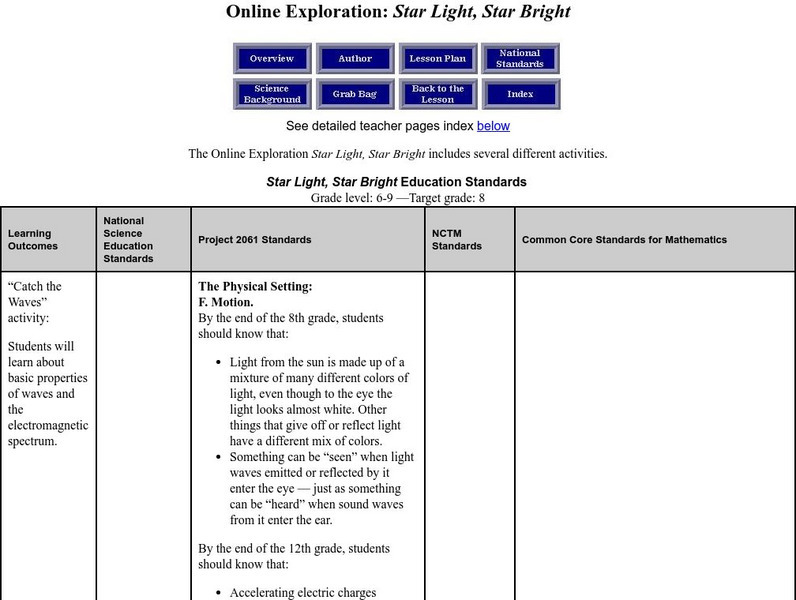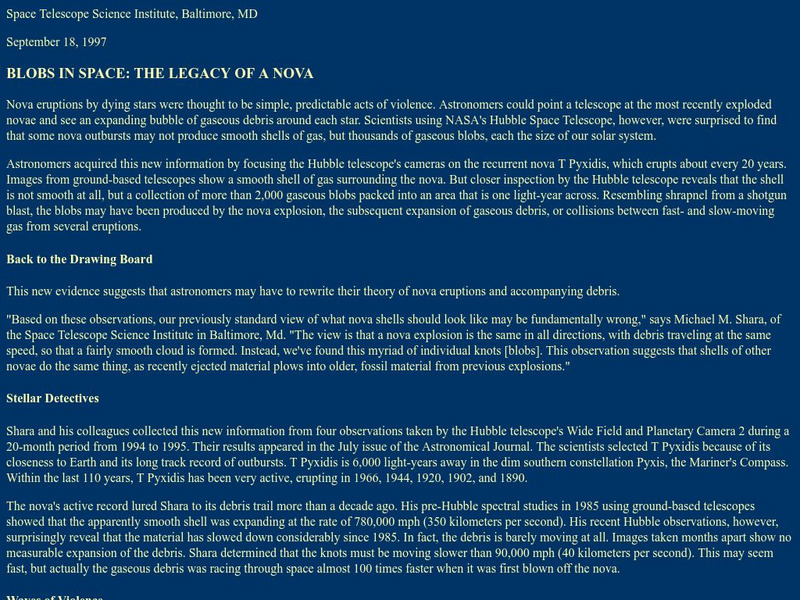Curated OER
Observing Mars in the Night Sky
Learners compare and contrast the orbits of Earth and Mars, locate the planet Mars, and diagram its retrograde motion.
Curated OER
Blast's Cosmic Carnival
Pupils, after analyzing the history of a concentrator, model how a Genesis spacecraft concentrator works by playing a game. In groups of three or four, after being given materials to work with, are challenged to roll the rubber balls so...
Curated OER
Who Am I? Famous Scientists
In this scientists worksheet, students read a brief synopsis of a scientist, then try to identify the person, 12 total. Worksheet contains links to additional activities.
The Tech Interactive
Tech Museum of Innovation: Eye on the Universe: The Hubble Space Telescope
This site provides information about the Hubble Space Telescope, and its mission into space.
Smithsonian Institution
National Air and Space Museum: Exploring the Planets: Tools of Exploration
Part of the National Air and Space Museum's online exhibition about Exploring Planets, this describes and gives visuals of telescopes, probes and fly-by aircrafts, orbiters, and landers as current methods for earth and airborne...
Curated OER
Rice University: The Telescope
This site from The Galileo Project of the Rice University provides an in depth history of the telescope and it's invention and growth over time. Too detailed for an Elementary student, but a great resource for an Elementary teacher.
Curated OER
Rice University: The Telescope
This site from The Galileo Project of the Rice University provides an in depth history of the telescope and it's invention and growth over time. Too detailed for an Elementary student, but a great resource for an Elementary teacher.
Curated OER
Rice University: The Telescope
This site from The Galileo Project of the Rice University provides an in depth history of the telescope and it's invention and growth over time. Too detailed for an Elementary student, but a great resource for an Elementary teacher.
Curated OER
Rice University: The Telescope
This site from The Galileo Project of the Rice University provides an in depth history of the telescope and it's invention and growth over time. Too detailed for an Elementary student, but a great resource for an Elementary teacher.
Curated OER
Rice University: The Telescope
This site from The Galileo Project of the Rice University provides an in depth history of the telescope and it's invention and growth over time. Too detailed for an Elementary student, but a great resource for an Elementary teacher.
Curated OER
Rice University: The Telescope
This site from The Galileo Project of the Rice University provides an in depth history of the telescope and it's invention and growth over time. Too detailed for an Elementary student, but a great resource for an Elementary teacher.
Curated OER
Rice University: The Telescope
This site from The Galileo Project of the Rice University provides an in depth history of the telescope and it's invention and growth over time. Too detailed for an Elementary student, but a great resource for an Elementary teacher.
California Institute of Technology
Submillimeter Wave Astrophysics at Caltech: Caltech's Submillimeter Observatory
Homepage of a radio telescope operated by Caltech in Hawaii. This radio telescope focusses on submillimeter frequencies. Be sure to look at the General Information link for info on telescope and the Astrophysics link to find information...
Other
Radio Sky Publishing: Site for Amateur Radio Astronomy
Site describes multiple resources for the beginner amateur radio astronomer. Great general information for beginners on basic radio physics and on the fundamentals of radio telescopes. Nice set of links to other useful sites.
University of Chicago
University of Chicago: History of Yerkes Observatory
Read about the history of the Yerkes Observatory, which was run by the University of Chicago. This observatory houses one of the few research grade refractors in the world. The observatory was closed in October 2018 and discussions were...
ClassFlow
Class Flow: Contributors to the Study of Light
[Free Registration/Login Required] This flipchart is intended to give a brief description of 4 people who contributed to the understanding of light through the use of microscopes and telescopes: Leeuwenhoek, Hooke, Galilei, and Newton.
Curated OER
Rice University: The Telescope
This site from The Galileo Project of the Rice University provides an in depth history of the telescope and it's invention and growth over time. Too detailed for an Elementary student, but a great resource for an Elementary teacher.
Curated OER
Ntnu Virtual Physics Lab: Thin Lens Combination
A Java applet which allows the user to emulate a refracting telescope and a light microscope. This is a great site to get information on the subject and better understand it through diagrams and charts.
Space Telescope Science Institute
Amazing Space: Star Light, Star Bright
This online exploration provides an opportunity to identify the different properties of waves and the relationship that exists between energy, wavelength, and frequency. Correlate images from the Hubble Telescope to the wavelength,...
Smithsonian Institution
National Air and Space Museum: Exploring the Planets: Early Discovery
This section of the exhibition gives the history of the discovery and study of space starting with the Greeks and Romans through to the early 1900's.
Other
Catching the Light: Astrophotography
Author and astrophotographer, Jerry Lodriguss, offers up tips, techniques and various images that he's taken both with and without the use of digital enhancement. An amazing amount of detail is provided to explain his approach towards...
PBS
Nova: Doomsday Asteroid Hale Bopp & Hyakutake
NOVA provides a report on comet Hale-Bopp and comet Hyakutake. Content includes discovery and observational information.
California Institute of Technology
Ipac: Iras Gallery
This site from IPAC is a series of images of various celestial objects and regions as viewed in infrared light. Each photo is accompanied by a caption.
Other
Astronet: Blobs in Space: The Legacy of a Nova
The expansion and explosion of a star is described at it goes through its nova phase. Current theories are discussed.
















